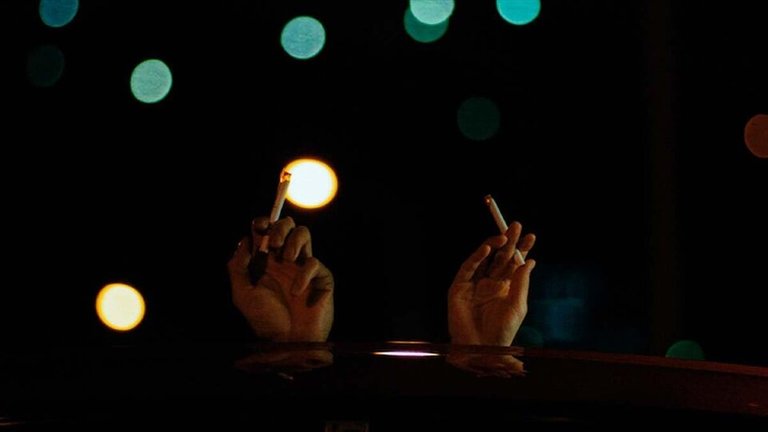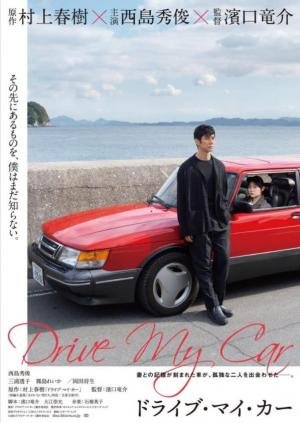Es una de las películas que se encuentra nominada a los premios Oscar para este año 2022. Fue realizada por el japonés Kyusuke Hamaguchi y se trata de un filme sumamente exigente.
Debido a mi lento internet tardé algo más de 5 días para verla completa. Lo hice en forma fragmentada y eso me dio la oportunidad de repensar la película en varias ocasiones. Normalmente, yo veo toda la película completa para tener una idea general del planteamiento, luego la vuelvo a mirar por bloques o en forma fragmentada para tener una idea más precisa de algunas secuencias o escenas.

Fuente: ecartelera

Below in English
Empezaré diciendo que me parece muy larga en cuanto a su duración. Posiblemente, ya me acostumbrado a mirar películas de una hora y media a dos horas que son capaces de mostrarnos una historia completa, aun cuando sea compleja. De allí que considero que Hamaguchi abusó del tiempo. Pero leyendo, sobre este director, comprendo que para él el tiempo cinematográfico no un problema, tal como se refleja en su cinematografía.
¿Por qué señalo al principio que se trata de un filme complejo? Por los referentes. Me explicaré más adelante. Drive my car podemos resumirla como una historia de duelos, de las disímiles relaciones humanas, de conexión con el arte y particularmente de la emociones que impulsan hacia la creación. Realmente, son varios temas. Pienso que cada espectador se quedará con el que más le toque las fibras de su piel.

Ahora bien, la película es un adaptación de un cuento de Haruki Murakami (Hombres sin mujeres, 2014). Su protagonista, Yusuke Kafuku quien es un director y actor de teatro, dirige una obra multilingüe de la obra Tío Vania de Chéjov, en Hiroshima. Él está de duelo por la muerte de Oto, su esposa. El proyecto de esa obra lo había elaborado juntos y ahora él está solo.
En un largo preámbulo inicial, con espejos para mostrar fragmentos del ser humano, Oto después de tener intimidad empieza a contar una historia. Pero no solo lo hace con él, ya que Kafuku descubre a su mujer siéndole infiel con el joven actor Köji Takatsuki. Esta primera historia se remonta a dos años atrás. No obstante, para Kyusuke Hamaguchi es fundamental ya que después de la muerte de Oto, por una hemorragia cerebral, Kafuku sufre una crisis nerviosa que le impide continuar con el proyecto de teatro de Tío Vania.
Si la película la está viendo un espectador inadvertido posiblemente no disfrute los distanciamientos que coloca Hamaguchi para proyectar el duelo por el que está pasando el director de teatro. Así que el referente de conocer, al menos una obra del escritor ruso Chéjov, puede ser una primera limitante para las audiencias.
Otro referente, que no puedo dejar de mencionar es Hiroshima. Un lugar que, según el director de este filme, sigue de duelo por la bomba atómica. Una tierra que sufre catástrofes ecológicas y que necesita sanar. En resumen, el protagonista Kyusuke Hamaguchi y el propio Japón (Hiroshima) necesitan sanar tras la pérdida.

Creo que en este momento la mayor parte de la audiencia comprende que se trata de una película diferente. La película recurre al teatro, cual obra expresionista, para movernos sobre las tablas y también sobre su vehículo un Saab 900 (un acercamiento al nombre del filme). La película nos habla de la incomunicación a través de una obra de dramaturgia, que coloca a Sonia –una actriz sordamuda- a mostrarnos un abrazo sanador. Es decir, existen otras maneras de comunicarnos más allá de las palabras.
Debo recordar, que en este filme, el lenguaje en vez de acercarnos nos puede alejar ya que nadie habla un mismo idioma y ese es el principal propósito de Tío Vania.
También, el lenguaje cinematográfico está muy bien concebido e intencionado, presentando planos y contraplanos para redefinir distancias lingüísticas. Desde mi punto de vista existen momentos muy emotivos en donde, a pesar de lo largo del filme, su ritmo nos envuelve.
No puedo dejar de mencionar a Misaki Watari quien será el chófer de Yusuke Kafuku. Ella logrará que el corazón de Kafuku obtenga su redención a través del viaje a la casa de infancia de él y las historias compartidas. Ambos se consuelan y ambos renacen para seguir viviendo, tal como lo propone Sonia en su emotivo monólogo final.
Creo que no puedo decirles nada más porque si no les contaría la película. Sugiero que tengan paciencia con el inicio que puede durar unos 45 minutos. De allí en adelante la historia les encantará. Deben tomar en cuenta que aún sin tener referentes cinematográficos esta obra la pueden disfrutar a plenitud si la ubican como una historia, de tantas, en cuanto a las relaciones humanas.
Estoy segura, como ya le ha pasado a muchos espectadores que si ven la película completa saldrán satisfechos y podrán encontrar explicaciones del amor como inspiración para crear historias.
Yo pienso que no ganará el premio Oscar a la Mejor Película Internacional pero sin lugar a dudas es una excelente propuesta que mueve el piso de cualquier crítico de cine.
Dirección: Ryūsuke Hamaguchi
Guion: Ryūsuke Hamaguchi y Takamasa Oe. Basada en Drive My Car de Hombres sin mujeres
Edición: Azusa Yamazaki
Música: Eiko Ishibashi
Duración: 179 minutos
País: Japón
Year: 2021
Reparto: Hidetoshi Nishijima (Yūsuke Kafuku), Tōko Miura (Misaki Watari), Masaki Okada (Kōji Takatsuki), Reika Kirishima (Oto Kafuku, esposa de Kafuku)
Fuente: Filmaffinity.

ENGLISH
It is one of the films that is nominated for the Oscars for this year 2022. It was made by Japanese director Kyusuke Hamaguchi and it is an extremely demanding film.
Due to my slow internet it took me a little over 5 days to watch it in its entirety. I did it in fragmented form and that gave me the opportunity to rethink the film several times. Normally, I watch the whole movie in its entirety to get a general idea of the approach, then I watch it again in blocks or in fragmented form to get a more precise idea of some sequences or scenes.

Source: Filmaffinity
I'll start by saying that I find it very long in terms of length. Possibly, I am already used to watching movies of an hour and a half to two hours that are able to show us a complete story, even if it is complex. Hence, I consider that Hamaguchi abused the time. But reading about this director, I understand that for him cinematic time is not a problem, as reflected in his cinematography.
Why did I point out at the beginning that this is a complex film? Because, of the references. I will explain further. Drive my car can be summarized as a story of duels, of dissimilar human relationships, of connection with art and particularly of the emotions that drive towards creation. Actually, there are several themes. I think that each viewer will choose the one that most touches the fibers of his or her skin.

Now, the film is an adaptation of a short story by Haruki Murakami (Men Without Women, 2014). His protagonist, Yusuke Kafuku who is a theater director, and actor, directs a multilingual play of Chekhov's Uncle Vanya in Hiroshima. He is mourning the death of Oto, his wife. The project for that play had been worked out together and now he is alone.
In a long opening preamble, with mirrors to show fragments of the human being, Oto after intimacy begins to tell a story. But it is not only with him, as Kafuku discovers his wife being unfaithful to him with the young actor Köji Takatsuki. This first story goes back two years. For Kyusuke Hamaguchi, however, it is pivotal because after Oto's death from a brain hemorrhage, Kafuku suffers a nervous breakdown that prevents him from continuing with the Uncle Vanya theater project.
If the film is being watched by an unwitting viewer, he or she may not enjoy the distancing Hamaguchi places to project the grief the theater director is going through. So the referent of knowing at least one play by the Russian writer Chekhov may be a first limiting factor for audiences.
Another reference, which I cannot fail to mention, is Hiroshima. A place that according to the director of this film, is still in mourning for the atomic bomb. A land suffering from ecological catastrophes and in need of healing. In short, the protagonist Kyusuke Hamaguchi and Japan (Hiroshima) itself need to heal after the loss.

I think at this point most of the audience understands that this is a different film. The film uses theater, like an expressionist play, to move us on the boards and also on its vehicle, a Saab 900 (a nod to the film's name). The film tells us about the lack of communication through a playwriting work, which places Sonia - a deaf and mute actress - to show us a healing embrace. In other words, there are other ways to communicate beyond words.
I must remember that in this film, language, instead of bringing us closer together, can drive us apart, since no one speaks the same language, and that is the main purpose of Tío Vania.
Also, the cinematographic language is very well conceived and intentional, presenting shots and counter shots to redefine linguistic distances. From my point of view there are very emotional moments where, despite the length of the film, its rhythm envelops us.
I can't fail to mention Misaki Watari who will be Yusuke Kafuku's chauffeur. She will make Kafuku's heart obtain redemption through a trip to his childhood home and shared stories. Both are comforted and both are reborn to live on, as Sonia proposes in her emotional final monologue.
I don't think I can tell you any more because otherwise I would tell you the movie. I suggest you be patient with the beginning which may last about 45 minutes. From then on you will love the story. You should take into account that even without having cinematographic references this work can be fully enjoyed if you place it as a story, one of many, regarding human relationships.
I am sure, as it has already happened to many viewers, that if you watch the whole movie you will be satisfied and you will be able to find explanations of love as an inspiration to create stories.
I don't think it will win the Oscar for Best International Film, but it is undoubtedly an excellent proposal that will move any film critic's heart.
Direction: Ryūsuke Hamaguchi
Screenplay: Ryūsuke Hamaguchi y Takamasa Oe. Basada en Drive My Car de Hombres sin mujeres
Editing: Azusa Yamazaki
Music: Eiko Ishibashi
Time: 179 minutos
Country:* Japan
Year: 2021
Cast: Hidetoshi Nishijima (Yūsuke Kafuku), Tōko Miura (Misaki Watari), Masaki Okada (Kōji Takatsuki), Reika Kirishima (Oto Kafuku, esposa de Kafuku)
Source: Filmaffinity.


Thanks for reading / Gracias por leer
Your comments are welcome / Bienvenidos sus comentarios
Infinite greetings! - ¡Saludos infinitos!


